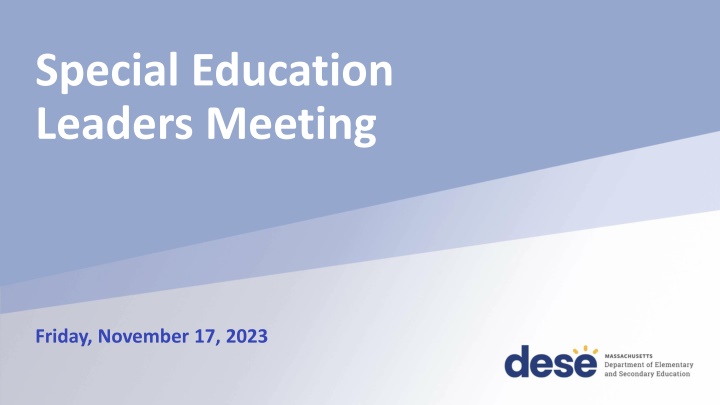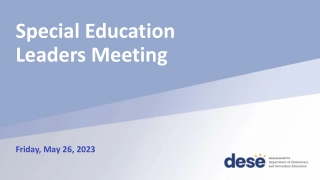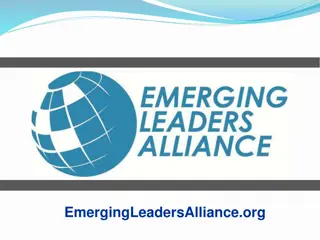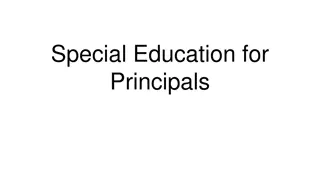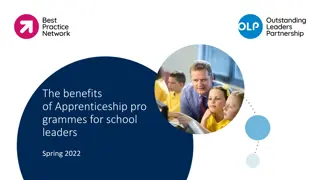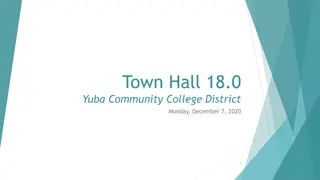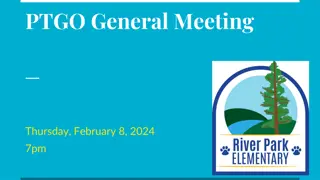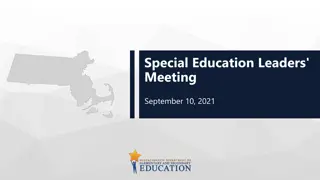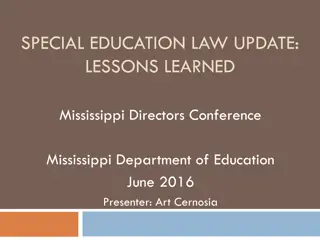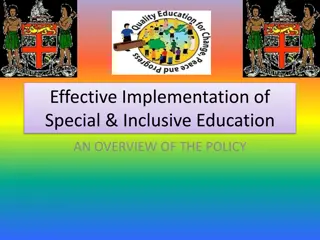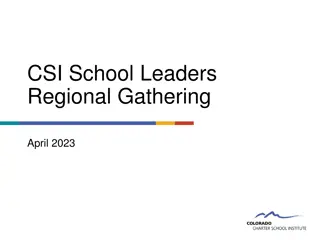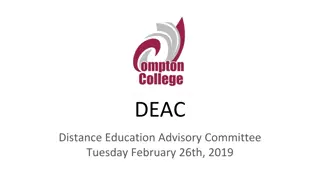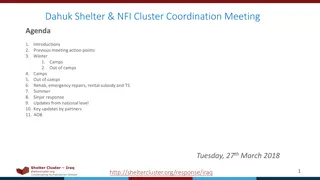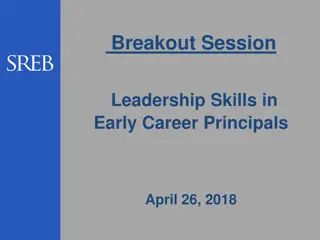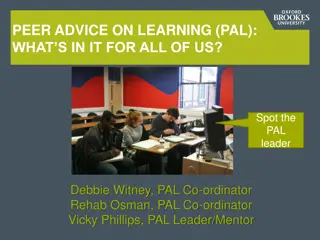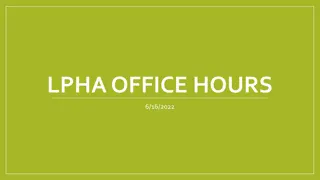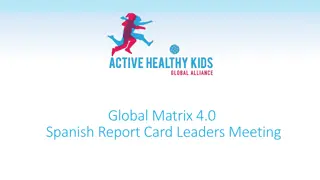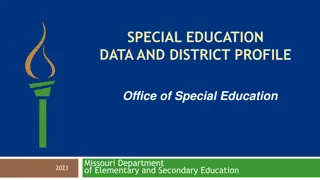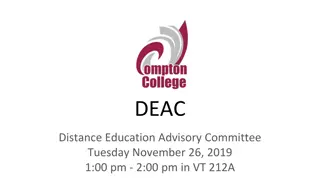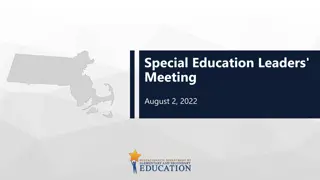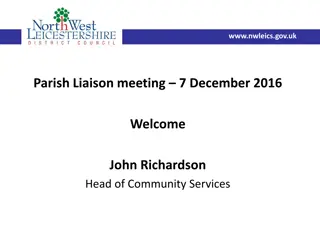Special Education Leaders Meeting Highlights & Updates
Special Education Leaders Meeting on November 17, 2023, focused on promoting inclusive and antiracist education, providing updates on referrals for students with ASD and IEP changes. DESE's Educational Vision emphasized equitable opportunities, culturally sustaining practices, and individualized supports. Kelsey LoDuca-Towne was introduced as the Assistant Director of the Problem Resolution System. The meeting reviewed the 2023 ELA and Math MCAS results, highlighting the performance of students with disabilities. Chronic absenteeism rates for 2023 were also discussed.
Download Presentation

Please find below an Image/Link to download the presentation.
The content on the website is provided AS IS for your information and personal use only. It may not be sold, licensed, or shared on other websites without obtaining consent from the author.If you encounter any issues during the download, it is possible that the publisher has removed the file from their server.
You are allowed to download the files provided on this website for personal or commercial use, subject to the condition that they are used lawfully. All files are the property of their respective owners.
The content on the website is provided AS IS for your information and personal use only. It may not be sold, licensed, or shared on other websites without obtaining consent from the author.
E N D
Presentation Transcript
Special Education Leaders Meeting Friday, November 17, 2023 1
Todays Agenda From DESE's Educational Vision: DESE works with districts, schools, and educators to promote teaching and learning that is antiracist, inclusive, multilingual, and multicultural; that values and affirms each and every student and their families; and that creates equitable opportunities and experiences for all students, particularly those who have been historically underserved. Special Education Updates and Reminders 688 Referrals for Students with ASD General Supervision Updates New IEP Updates 2
DESE's Educational Vision What principles guide our work? What does that look like in a classroom? All students in Massachusetts, particularly students from historically underserved groups and communities Culturally and linguistically sustaining classroom and school practices High expectations with targeted support All students Are known and valued Learning experiences Are relevant, real-world and interactive Enable students to excel at grade level and beyond Individualized supports Hyperlink to Ed Vision Massachusetts Department of Elementary and Secondary Education 3
Introducing Kelsey LoDuca-Towne Assistant Director, Problem Resolution System 5 5
2023 ELA MCAS Results Percentage of Students Meeting or Exceeding Expectations 2023 ELA MCAS 100 90 80 66.5 70 Percent (%) 60 52.1 52.0 50 40 30 22.1 20 14.9 11.8 10 0 Grade 3 14.9 52.1 Grade 8 11.8 52.0 Grade 10 22.1 66.5 Students w/ disabilities Students w/out disabilities 6
2023 MCAS Math Results Percentage of Students Meeting or Exceeding Expectations 2023 Math MCAS 100 90 80 70 57.4 Percent (%) 60 48.4 50 45.2 40 26.0 30 20 15.1 9.2 10 0 Grade 3 15.1 48.4 Grade 8 9.2 45.2 Grade 10 26.0 57.4 Students w/ disabilities Students w/out disabilities 7
2023 Chronic Absenteeism Rates Percentage of Students Chronically Absent, 2023 100 90 80 70 60 Percent (%) 50 40 30.4 30 20.1 20 10.1 10 5.1 0 Missing 10% of school days 30.4 20.1 Missing 20% of school days 10.1 5.1 Students w/ disabilities Students w/out disabilities 8
2023 Student Discipline All Categories Percentage of Students Disciplined 10 9 8 7 6 Percent (%) 4.7 5 4 3 2.5 1.9 2 1.1 0.7 1 0.2 0 % In-School Suspension 2.5 1.1 % Out-of-School Suspension 4.7 1.9 % Emergency Removal 0.7 0.2 Students w/ disabilities Students w/out disabilities 9
Equitable Services Reminders Reminders for Year 3 of the Resolution Funds (FY2024) Timely and Meaningful Consultation (written affirmations must include the Resolution Funds) Midyear Self-Assessment (amount of funds expended to date and use of funds) Evidence of Expenditures (may be requested by the Department) Summer Summative Survey (confirm funds expended and use of funds) General Reminders- Equitable Services Carryover Questionnaire (must completed and be approved before funds can be used for general IDEA expenditures) Child Count (October 1stcount used to determine proportionate share for the following fiscal year) 10
Updated Dyslexia Guidance Chapter 9 updated with more robust information to center the unique assets of multilingual learners who are at risk for dyslexia. School and district leaders are encouraged to use the recommendations and considerations outlined to approach assessment and instruction through a culturally and linguistically sustaining lens. Updated guidance is located here. 11
Reminder from OSEP: Tiered Systems of Support Multi-Tiered System of Supports (MTSS)/Response to Intervention (RTI) Process Cannot Be Used to Delay/Deny an Initial Evaluation (April 10, 2023) OSEP Memorandum 11-07- RTI Process Cannot Be Used to Delay- Deny an Evaluation for Eligibility under the Individuals with Disabilities Education Act (IDEA) (January 21, 2011) OSEP Memorandum 16-07- A Response to Intervention Process Cannot be Used to Delay-Deny an Evaluation for Preschool Education Services under IDEA (April 29, 2016) * The memos apply to tiered systems of support including MTSS. 12 12
Key Takeaways from the OSEP Memos LEAs must ensure there are systems in place for meeting the child find requirements as a condition for funding. IDEA Part B regulations at 34 C.F.R. 300.301(b) allow a parent to request an initial evaluation at any time to determine if a child is a child with a disability under IDEA. MTSS may not be used to delay or deny a full and individual evaluation under 34 C.F.R. 300.304-300.311 for a child suspected of having a disability. IDEA does not require or encourage a local or preschool program to use an MTSS approach prior to referral for evaluation or as part of determining whether a 3-, 4-, or 5-year-old is eligible for special education and related services. Once an LEA receives a referral from a preschool program, the LEA must initiate an evaluation process to determine if the child is a child with a disability. 13 13
Reminder: Requirement to Monitor Provision of Services and Programs to Students The school district is required to monitor the provision of services to and the programs of individual students placed out-of-district. Documentation of monitoring plans and all actual monitoring shall be placed in the files of every eligible student who has been placed out-of- district. To the extent that this monitoring requires site visits, such site visits shall be documented and placed in the students' files for review. The duty to monitor out-of-district placements cannot be delegated to parents or their agents, to the Department, or to the out-of-district placement. The school district may, however, contract directly with a person to conduct such monitoring. 603 CMR 28.06(3)(b). 14
Reminder: Students Placed in Private Schools by School Districts A child with a disability who is placed in or referred to a private school or facility by a public agency must be: (a) provided special education and related services (1) In conformance with an IEP that meets the requirements of 300.320 through 300.325; and (2) At no cost to the parents; (b) Is provided an education that meets the standards that apply to education provided by the SEA and LEAs including the requirements of this part, except for 300.156(c); and (c) Has all of the rights of a child with a disability who is served by a public agency. See 34 C.F.R. 300.146. 15
Reminder of Requirements The out-of-district placement shall afford publicly-funded students all the substantive and procedural rights held by eligible students, including but not limited to those specified in 603 CMR 28.09, and shall comply with all other applicable requirements of 603 CMR 28.00 and applicable policy statements and directives issued by the Department. 603 CMR 28.06(3)(f)(4). 16
Mileage Reimbursement Reminder Effective July 17, 2022, state employees became eligible to receive reimbursement for transportation at the rate of $0.62 per mile. Therefore, if a parent provides transportation to an eligible student requiring special transportation consistent with the requirements of 603 CMR 28.05(5)(b), the school district shall reimburse such parent the prevailing rate per mile for state employees. No parent shall be obligated to provide such transportation. DESE s July 2022 Mileage Reimbursement Advisory can be found here 17
Friday, December 15, 2023 noon to 1pm Friday, January 26, 2024 11am to noon Friday, February 9, 2024 noon to 1pm Friday, March 29, 2024 noon to 1pm April 2024 TBA May 17, 2024 noon to 1pm June 21, 2024 noon to 1pm Special Special Education Education Leaders Leaders Meetings Meetings 2023 2023- -2024 2024 Reminder that if you are not able to attend, we post slides and recordings of these meetings here 18
688 Referrals for Students with ASD Chris Peltier DDS Director of Adult Autism Supports christopher.j.peltier@mass.gov
A Little History A Little History DDS has always served people with autism and intellectual disabilities Beginning in 2014 with the passage of the Autism Omnibus Bill, our eligibility standards changed and DDS became the lead agency for autistic individuals in the Commonwealth without an accompanying ID diagnosis as well We currently serve almost 5,000 adults with ASD without cognitive challenges, and the number of these eligible adults is growing rapidly
The Message for IEP Teams The Message for IEP Teams Every student identified with ASD - primary, secondary or tertiary should be referred to DDS through the 688 process with the student s/parent s consent 2 years prior to their anticipated graduation date This is true regardless of IQ or academic performance autistic students with average or even above average academic skills may require significant supports in other domains to make a successful transition into adult life Students & families should be encouraged to apply for DDS adult eligibility when students turn 17. A DDS eligibility determination will be made based on the IEP and evaluations submitted during the application process
Why is 688 so Important for Students with ASD? Why is 688 so Important for Students with ASD? Connection to an adult service agency and to a Transition or ASD Service Coordinator can make the transition process smoother and less chaotic for schools, families and DDS Planning time for ISP teams to work together to identify a post secondary vision and look at available community supports Funding for adult services is triggered by the 688 process students who come to us without a 688 are still eligible, but it will be much more difficult for DDS to serve them adequately
Examples of Available DDS ASD Examples of Available DDS ASD- -Only Services Only Services Employment Supports Coaching & College Navigation Flexible Funding Community Access & Social Recreation Clinical Supports Service Coordination Self-advocacy and Peer Support Groups
Working Together Working Together DDS wants to partner well with public schools in this transition process. We recognize that schools have a lot on their plates currently, and that staffing shortages and turn-over complicate the 688 process and transition in general. DDS Area & Regional staff are available for training and consultation for ETL s and other school leaders on 688, adult service options and available service providers in your area
New IEP Updates 25 25
Registration Link for School Personnel: https://airtable.com/appZBV9AbaI0sTuS4/shrYP9 ZunhL9yk980 26 26
IEP Implementation Grant Update Name of Grant Program: Individuals with Disabilities Education Act Part B (IDEA) Targeted Improvement Grant Federal Targeted - IEP Implementation Project Grant Fund Code: 274 27
IEP Resources IEP Technical Guide Two sample IEPs Training of trainer materials Parent letter (translated) IEP Improvement Playbook Available at this link All available at this link 28
Resources in Development Resource guides Parent guide to the new IEP process Transition Dually identified students (English learners and students with disabilities) Additional Forms, such as: Eligibility flowchart Notice of procedural actions Placement pages 29
IEP Playbook: Sample promising practices Family Engagement 3030
Where does family engagement come up in the new IEP forms? Gathering information on student and family concerns 31
Where does family engagement come up in the new IEP forms? (continued) Highlighting the student s vision for the future and incorporating family perspectives into the team vision statement And throughout the IEP, where teams should be attentive to family questions, suggestions, and concerns 32
What are some promising practices that can help in this process? Structure IEP meetings thoughtfully so family members feel welcomed and included rather than overwhelmed Staff at School F are intentional about how they enter the IEP meeting so families don t feel overwhelmed. The special education teacher leading the meeting brings staff in gradually so that they can introduce themselves to the family one at a time typically beginning with the school psychologist, then specialists, then the student s general education teacher, and ending with the adjustment counselor, who most families already know. 33
What are some promising practices that can help in this process? page2 School F has implemented strength mapping in every IEP meeting. The meeting begins with each attendee stating one strength that the student possesses. They record strengths on a poster as a web of attributes surrounding the student s name and hang the poster on the wall throughout the meeting. They have found that the exercise empowers families at the onset to be active participants throughout the meeting. Families and students love having the strength map to take home, and many students choose to display it in their bedrooms. Center student strengths by strength mapping during IEP meetings 34
What are some promising practices that can help in this process? Page 3 If possible, offer pre- and post-IEP meetings to ensure families are comfortable with the process and result School F holds pre- and post-IEP meetings for families. The pre- meetings run for approximately 15-20 minutes and cover what to expect during the IEP meeting. Post-meetings are longer (generally 30-45 minutes) and include a section-by-section discussion of the student s IEP so that the family fully understands the services that will be provided. As a result of these meetings, the school has had very few IEPs rejected by families. 35
What are some promising practices that can help in this process? Page 4 Think proactively about how to build relationships with families and convey critical information including before the evaluation process begins. School F partnered with their local food pantry. School personnel staffed a table and distributed supplies to families as a means to initiate conversation. The school also established a presence at dinners hosted by their local Boys and Girls Club. This work fostered trust and camaraderie with families. District E developed a website containing resources informing families about the special education referral process, tiered interventions, and the District Curriculum Accommodation Plan, centralizing resources in one place. 36
States must have a system of general supervision an accountability and support system that monitors local education agencies (LEAs) and assists LEAs to implement the Individuals with Disabilities Education Act (IDEA). Primary focus: Educational Results Functional Outcomes 38 38
Coherence Matters! Imagine a general supervision system as a sophisticated machine comprised of many interlocking gears that all must operate in concert to produce the desired outcomes. 39 39
40 40 40
What is the problem or opportunity we are seeking to address and what would be the desired outcome on equity, particularly racial equity? Define the Initiative Analyze Data and Historical Context What data are we using to inform our initiative? Are there data gaps? Accountability Process How will we evaluate and communicate results? Who are the most affected stakeholders and how will they been involved in the development of this initiative? Implementatio n and Viability Engage Stakeholders Is the initiative realistic, adequately funded, and resourced? Identify RacialEquity Strategies andImpact Based on data analysis & stakeholder input, what strategies will advance diversity, equity, and inclusion, particularly racial equity?
2023-24 DESE/BSEA General Supervision Related Updates and Initiatives Dispute Resolution and Mediation Procedures Conditions for Assistance Fiscal Monitoring Procedures Data Protocols Policies and Procedures Manual LEA OASES Procedures PRS Procedures Determinations Technical Assistance PSM Procedures 42
Fall and Winter Deliverables LEA Determinations (December) SPP/APR (February) Technical Assistance (January) 43
Fall and Winter DeliverablesBeginning of Public Comment Period OASES Procedures (December) PSM Procedures (December) PRS Procedures (December) Dispute Resolution and Mediation Procedures (February) 44
Updated Procedures Stakeholder Engagement Extended public comment period with emphasis on input from diverse stakeholders Special Education Advisory Panel Meeting (OASES, PRS and PSM Procedures) BSEA Advisory Council Meeting (Dispute Resolution and Mediation Procedures) 45
Q&A 46 46
